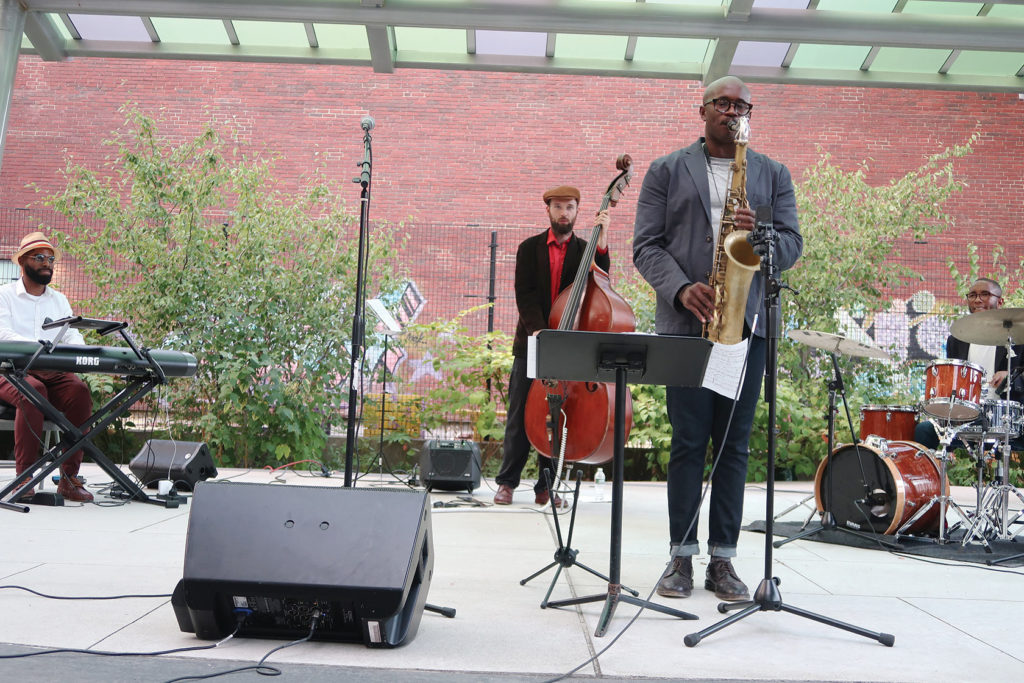Gregory Groover Jr. closes out Mission Hill Arts Fest
Saxophonist finds inspiration in Black sacred music

The second annual Mission Hill Arts Festival concluded its summer-long series of outdoor art events on Saturday evening with a concert inspired by traditional Black American sacred music.
Entitled “A Modern Exploration of Negro Spirituals,” and performed by tenor saxophonist Gregory Groover Jr. and his ensemble, the event included an interlude for audience members to talk with the musicians. This combination is a signature element of the series, highlighted in its poster tagline, “to gather and enjoy art and conversation.”
Mission Hill residents Luisa Harris and her husband, jazz musician and educator Kevin Harris, founded the festival in the summer of 2021 to raise, they say, “a sense of joyful connectedness and community.”
Luisa Harris, festival curator, secured sponsors and partners that include the Celebrity Series of Boston, a cohost of this season’s three musical events. She also found a congenial home for the festival in The Yard, a leafy neighborhood setting behind the Tobin Community Center equipped with a stage and excellent acoustics.
Groover, co-chair of music at his alma mater the Boston Arts Academy, has been conducting a contemporary exploration of spirituals, including those he heard in the church of his Boston childhood. He has recorded two albums, “Negro Spiritual Songbook, Vol. I,” and in 2021, “Negro Spiritual Songbook, Vol. 2 (The Message),” that combine original compositions and interpretations of traditional hymns.
Performing with Groover last Saturday were two of the musicians who accompanied him on the recordings: pianist Jesse Taitt, who is on the faculty of Dartmouth College and Berklee College of Music, and bassist Max Ridley, a fellow graduate of Boston Arts Academy. Drummer Tyson Jackson, from West Palm Beach, Florida, recalls as a 3-year-old beating on hymnals during church services. All four are Berklee graduates and long-time friends and collaborators with distinguished careers as jazz performers and educators.
Groover sustained a warm, soulful tone with his saxophone throughout a continuum of selections that inspired a rich interplay among the musicians as they moved through ballads, hymns, improvisational rhythmic currents, melodic passages and quotes of hallowed hymns such as “Go Down Moses (Let My People Go).”
Tempos varied, as did textures, from ripples to surging unison ascents, and each musician took a turn at both lyrical lines and spare chordal riffs. Injecting flavors of bebop, blues and hip-hop into traditional songs, they sampled compositions from the recent album, including Groover’s tribute to Muhammad Ali, “Rumble Young Man, Rumble (Soon Ah Will Be Done).”
While conversing with the audience, Groover was asked about his use of the term “Negro” to describe his music. Groover said, “I’m proud of that title, which is associated with the history and tradition of the form.” Spirituals continue to evolve, Groover said. “They are story-telling and should reference their time.” Citing Jay-Z, a rapper he admires, Groover said, “He’s telling stories of people today.”
Interviewed on GBH’s “Boston Public Radio” the day before, Groover said, “These songs continue. They got us over, showed us a new day we hoped and longed for, and still guide us. They are messages inspired by the spirit, and that continues. It doesn’t end.”






